Impact of Digital Marketing on Hilton Hotel, UK: Dissertation
VerifiedAdded on 2023/04/05
|62
|12160
|52
Project
AI Summary
This dissertation analyzes the impact of digital marketing on Hilton Hotel in the UK. It explores the advantages of digital marketing for hotels, focusing on Hilton's use of social media, online reviews, and mobile advertising to enhance customer engagement and brand loyalty. The research employs a positivism philosophy, descriptive design, and deductive approach, using secondary thematic analysis of literature and Hilton's online presence. The study investigates the role of social media in tourism and hospitality, the impact of online consumer reviews on sales, and the challenges and future of digital marketing within the hotel industry. Findings indicate the necessity of digital strategies for Hilton's success, emphasizing the importance of platforms like Facebook for promotion and customer interaction. The dissertation concludes by answering research questions about digital marketing's role, challenges, and future for Hilton, providing recommendations for optimizing digital strategies. The study highlights how digital marketing has evolved from transactional to relationship-based, focusing on customer satisfaction and long-term engagement.
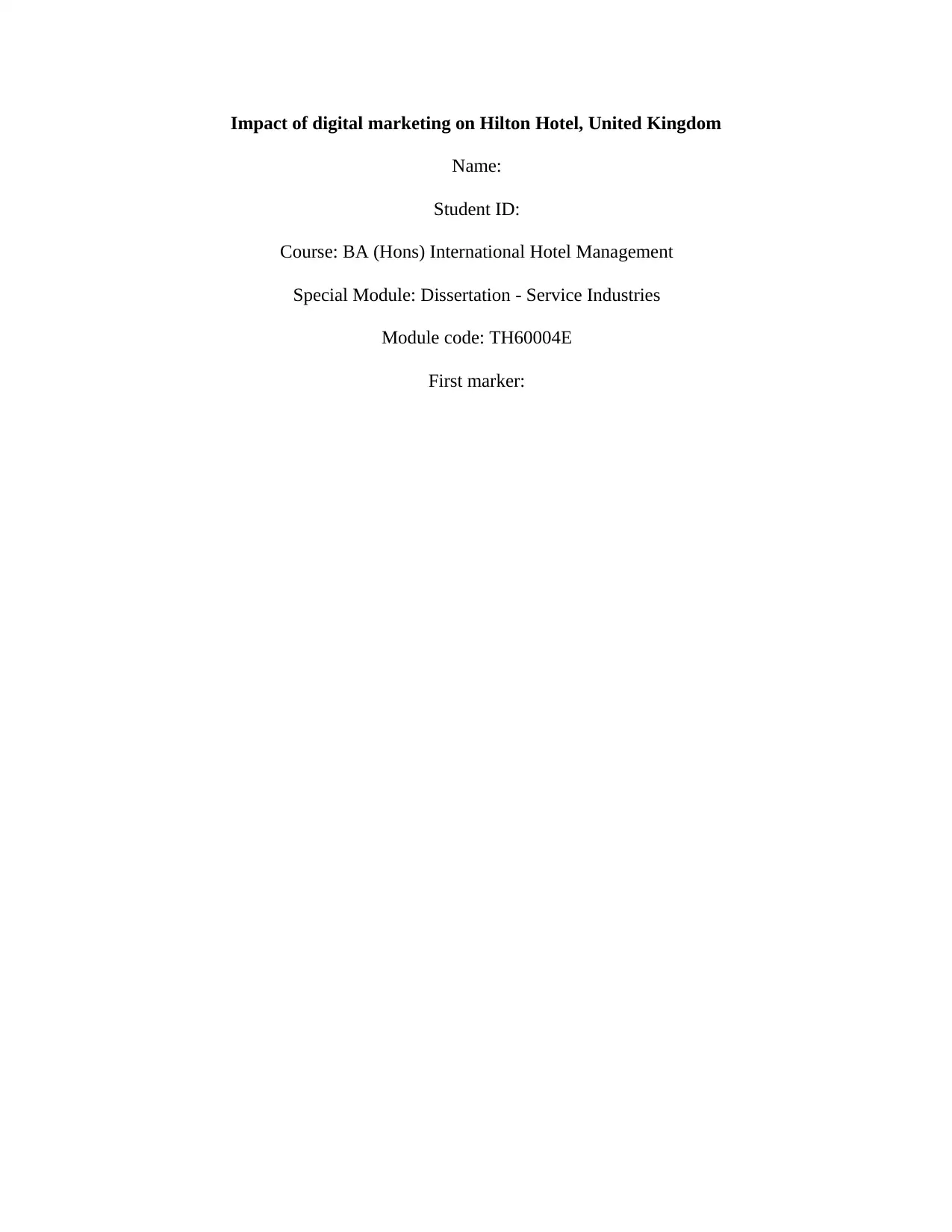
Impact of digital marketing on Hilton Hotel, United Kingdom
Name:
Student ID:
Course: BA (Hons) International Hotel Management
Special Module: Dissertation - Service Industries
Module code: TH60004E
First marker:
Name:
Student ID:
Course: BA (Hons) International Hotel Management
Special Module: Dissertation - Service Industries
Module code: TH60004E
First marker:
Paraphrase This Document
Need a fresh take? Get an instant paraphrase of this document with our AI Paraphraser
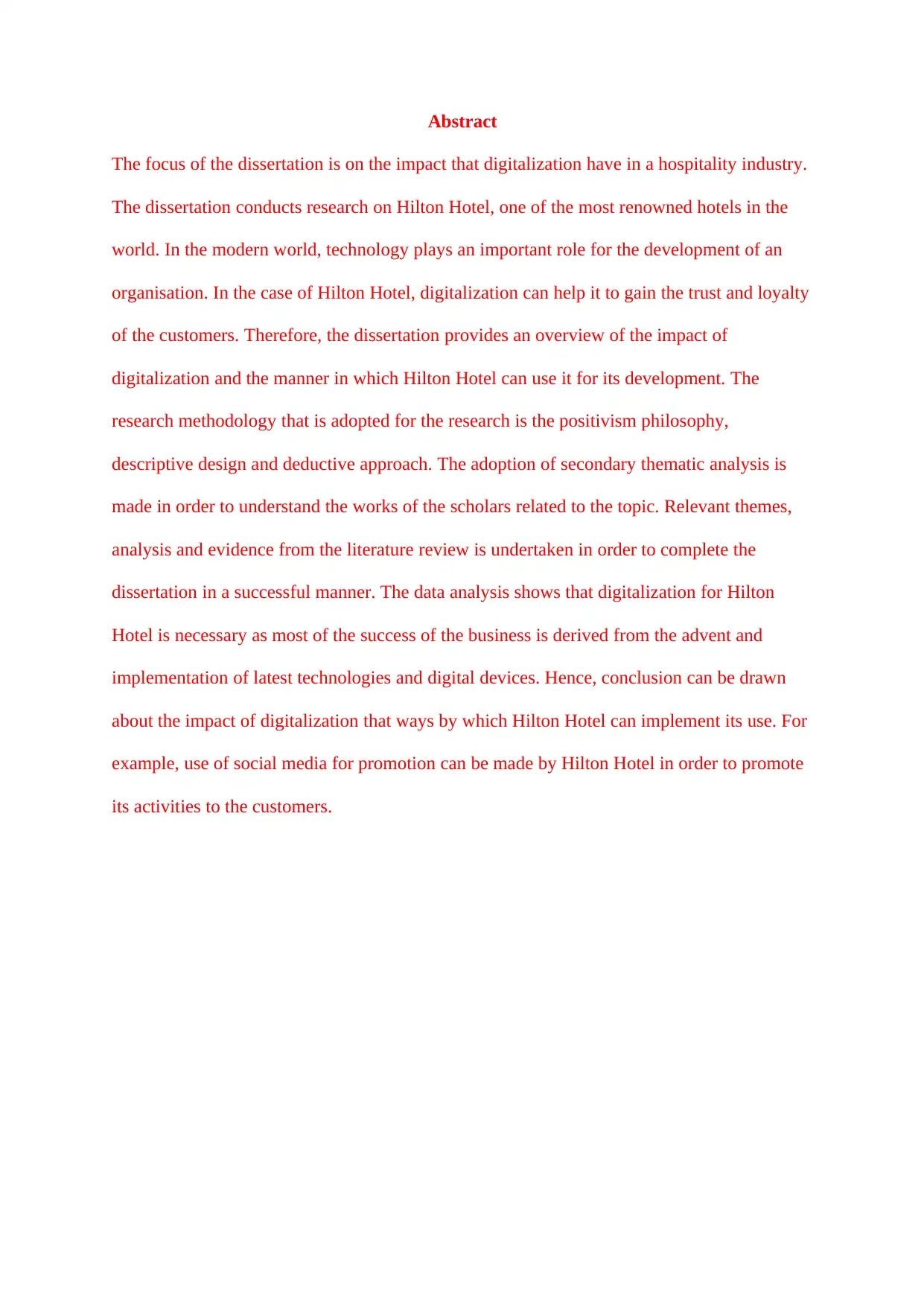
Abstract
The focus of the dissertation is on the impact that digitalization have in a hospitality industry.
The dissertation conducts research on Hilton Hotel, one of the most renowned hotels in the
world. In the modern world, technology plays an important role for the development of an
organisation. In the case of Hilton Hotel, digitalization can help it to gain the trust and loyalty
of the customers. Therefore, the dissertation provides an overview of the impact of
digitalization and the manner in which Hilton Hotel can use it for its development. The
research methodology that is adopted for the research is the positivism philosophy,
descriptive design and deductive approach. The adoption of secondary thematic analysis is
made in order to understand the works of the scholars related to the topic. Relevant themes,
analysis and evidence from the literature review is undertaken in order to complete the
dissertation in a successful manner. The data analysis shows that digitalization for Hilton
Hotel is necessary as most of the success of the business is derived from the advent and
implementation of latest technologies and digital devices. Hence, conclusion can be drawn
about the impact of digitalization that ways by which Hilton Hotel can implement its use. For
example, use of social media for promotion can be made by Hilton Hotel in order to promote
its activities to the customers.
The focus of the dissertation is on the impact that digitalization have in a hospitality industry.
The dissertation conducts research on Hilton Hotel, one of the most renowned hotels in the
world. In the modern world, technology plays an important role for the development of an
organisation. In the case of Hilton Hotel, digitalization can help it to gain the trust and loyalty
of the customers. Therefore, the dissertation provides an overview of the impact of
digitalization and the manner in which Hilton Hotel can use it for its development. The
research methodology that is adopted for the research is the positivism philosophy,
descriptive design and deductive approach. The adoption of secondary thematic analysis is
made in order to understand the works of the scholars related to the topic. Relevant themes,
analysis and evidence from the literature review is undertaken in order to complete the
dissertation in a successful manner. The data analysis shows that digitalization for Hilton
Hotel is necessary as most of the success of the business is derived from the advent and
implementation of latest technologies and digital devices. Hence, conclusion can be drawn
about the impact of digitalization that ways by which Hilton Hotel can implement its use. For
example, use of social media for promotion can be made by Hilton Hotel in order to promote
its activities to the customers.
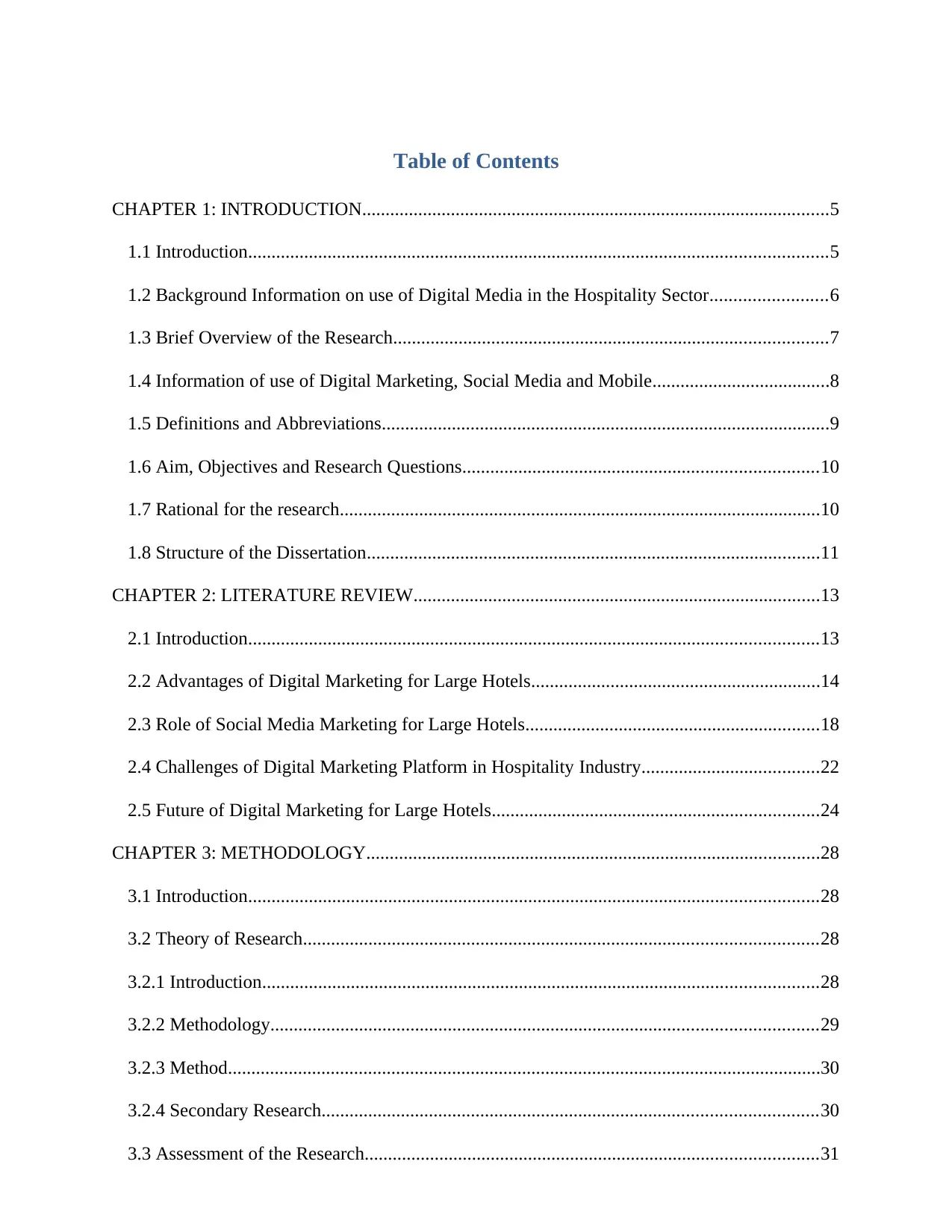
Table of Contents
CHAPTER 1: INTRODUCTION....................................................................................................5
1.1 Introduction............................................................................................................................5
1.2 Background Information on use of Digital Media in the Hospitality Sector.........................6
1.3 Brief Overview of the Research.............................................................................................7
1.4 Information of use of Digital Marketing, Social Media and Mobile......................................8
1.5 Definitions and Abbreviations................................................................................................9
1.6 Aim, Objectives and Research Questions............................................................................10
1.7 Rational for the research.......................................................................................................10
1.8 Structure of the Dissertation.................................................................................................11
CHAPTER 2: LITERATURE REVIEW.......................................................................................13
2.1 Introduction..........................................................................................................................13
2.2 Advantages of Digital Marketing for Large Hotels..............................................................14
2.3 Role of Social Media Marketing for Large Hotels...............................................................18
2.4 Challenges of Digital Marketing Platform in Hospitality Industry......................................22
2.5 Future of Digital Marketing for Large Hotels......................................................................24
CHAPTER 3: METHODOLOGY.................................................................................................28
3.1 Introduction..........................................................................................................................28
3.2 Theory of Research..............................................................................................................28
3.2.1 Introduction.......................................................................................................................28
3.2.2 Methodology.....................................................................................................................29
3.2.3 Method...............................................................................................................................30
3.2.4 Secondary Research..........................................................................................................30
3.3 Assessment of the Research.................................................................................................31
CHAPTER 1: INTRODUCTION....................................................................................................5
1.1 Introduction............................................................................................................................5
1.2 Background Information on use of Digital Media in the Hospitality Sector.........................6
1.3 Brief Overview of the Research.............................................................................................7
1.4 Information of use of Digital Marketing, Social Media and Mobile......................................8
1.5 Definitions and Abbreviations................................................................................................9
1.6 Aim, Objectives and Research Questions............................................................................10
1.7 Rational for the research.......................................................................................................10
1.8 Structure of the Dissertation.................................................................................................11
CHAPTER 2: LITERATURE REVIEW.......................................................................................13
2.1 Introduction..........................................................................................................................13
2.2 Advantages of Digital Marketing for Large Hotels..............................................................14
2.3 Role of Social Media Marketing for Large Hotels...............................................................18
2.4 Challenges of Digital Marketing Platform in Hospitality Industry......................................22
2.5 Future of Digital Marketing for Large Hotels......................................................................24
CHAPTER 3: METHODOLOGY.................................................................................................28
3.1 Introduction..........................................................................................................................28
3.2 Theory of Research..............................................................................................................28
3.2.1 Introduction.......................................................................................................................28
3.2.2 Methodology.....................................................................................................................29
3.2.3 Method...............................................................................................................................30
3.2.4 Secondary Research..........................................................................................................30
3.3 Assessment of the Research.................................................................................................31
⊘ This is a preview!⊘
Do you want full access?
Subscribe today to unlock all pages.

Trusted by 1+ million students worldwide
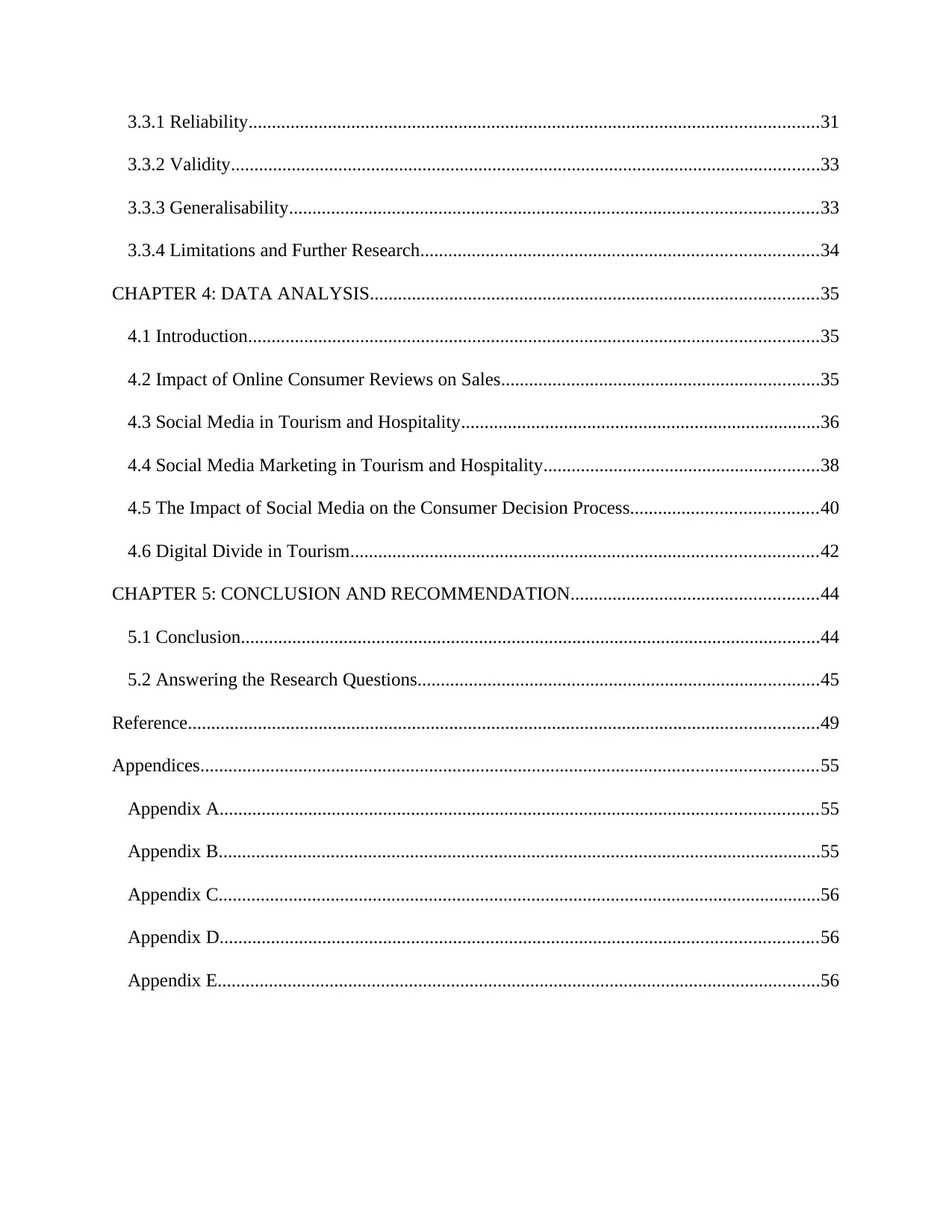
3.3.1 Reliability..........................................................................................................................31
3.3.2 Validity..............................................................................................................................33
3.3.3 Generalisability.................................................................................................................33
3.3.4 Limitations and Further Research.....................................................................................34
CHAPTER 4: DATA ANALYSIS................................................................................................35
4.1 Introduction..........................................................................................................................35
4.2 Impact of Online Consumer Reviews on Sales....................................................................35
4.3 Social Media in Tourism and Hospitality.............................................................................36
4.4 Social Media Marketing in Tourism and Hospitality...........................................................38
4.5 The Impact of Social Media on the Consumer Decision Process........................................40
4.6 Digital Divide in Tourism....................................................................................................42
CHAPTER 5: CONCLUSION AND RECOMMENDATION.....................................................44
5.1 Conclusion............................................................................................................................44
5.2 Answering the Research Questions......................................................................................45
Reference.......................................................................................................................................49
Appendices....................................................................................................................................55
Appendix A................................................................................................................................55
Appendix B.................................................................................................................................55
Appendix C.................................................................................................................................56
Appendix D................................................................................................................................56
Appendix E.................................................................................................................................56
3.3.2 Validity..............................................................................................................................33
3.3.3 Generalisability.................................................................................................................33
3.3.4 Limitations and Further Research.....................................................................................34
CHAPTER 4: DATA ANALYSIS................................................................................................35
4.1 Introduction..........................................................................................................................35
4.2 Impact of Online Consumer Reviews on Sales....................................................................35
4.3 Social Media in Tourism and Hospitality.............................................................................36
4.4 Social Media Marketing in Tourism and Hospitality...........................................................38
4.5 The Impact of Social Media on the Consumer Decision Process........................................40
4.6 Digital Divide in Tourism....................................................................................................42
CHAPTER 5: CONCLUSION AND RECOMMENDATION.....................................................44
5.1 Conclusion............................................................................................................................44
5.2 Answering the Research Questions......................................................................................45
Reference.......................................................................................................................................49
Appendices....................................................................................................................................55
Appendix A................................................................................................................................55
Appendix B.................................................................................................................................55
Appendix C.................................................................................................................................56
Appendix D................................................................................................................................56
Appendix E.................................................................................................................................56
Paraphrase This Document
Need a fresh take? Get an instant paraphrase of this document with our AI Paraphraser

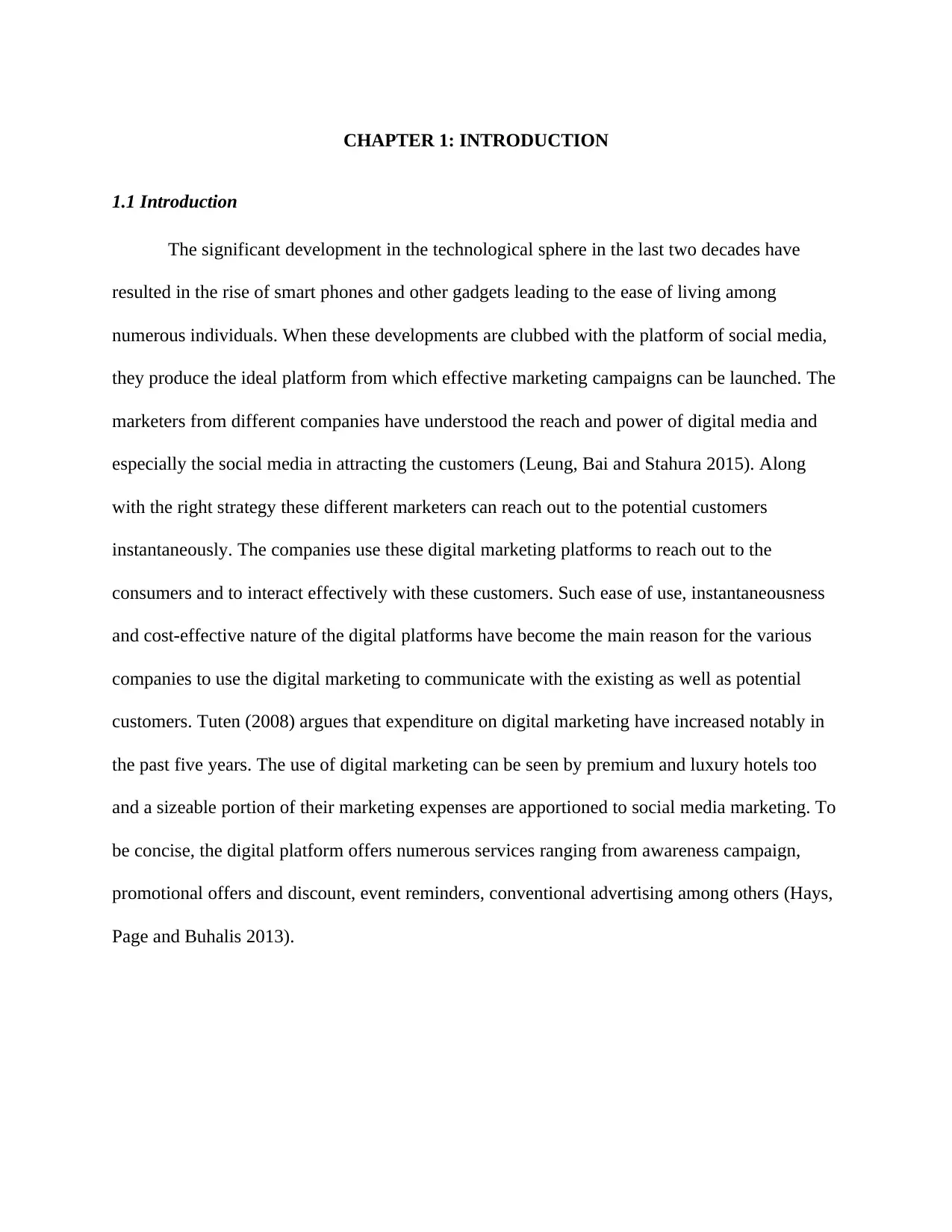
CHAPTER 1: INTRODUCTION
1.1 Introduction
The significant development in the technological sphere in the last two decades have
resulted in the rise of smart phones and other gadgets leading to the ease of living among
numerous individuals. When these developments are clubbed with the platform of social media,
they produce the ideal platform from which effective marketing campaigns can be launched. The
marketers from different companies have understood the reach and power of digital media and
especially the social media in attracting the customers (Leung, Bai and Stahura 2015). Along
with the right strategy these different marketers can reach out to the potential customers
instantaneously. The companies use these digital marketing platforms to reach out to the
consumers and to interact effectively with these customers. Such ease of use, instantaneousness
and cost-effective nature of the digital platforms have become the main reason for the various
companies to use the digital marketing to communicate with the existing as well as potential
customers. Tuten (2008) argues that expenditure on digital marketing have increased notably in
the past five years. The use of digital marketing can be seen by premium and luxury hotels too
and a sizeable portion of their marketing expenses are apportioned to social media marketing. To
be concise, the digital platform offers numerous services ranging from awareness campaign,
promotional offers and discount, event reminders, conventional advertising among others (Hays,
Page and Buhalis 2013).
1.1 Introduction
The significant development in the technological sphere in the last two decades have
resulted in the rise of smart phones and other gadgets leading to the ease of living among
numerous individuals. When these developments are clubbed with the platform of social media,
they produce the ideal platform from which effective marketing campaigns can be launched. The
marketers from different companies have understood the reach and power of digital media and
especially the social media in attracting the customers (Leung, Bai and Stahura 2015). Along
with the right strategy these different marketers can reach out to the potential customers
instantaneously. The companies use these digital marketing platforms to reach out to the
consumers and to interact effectively with these customers. Such ease of use, instantaneousness
and cost-effective nature of the digital platforms have become the main reason for the various
companies to use the digital marketing to communicate with the existing as well as potential
customers. Tuten (2008) argues that expenditure on digital marketing have increased notably in
the past five years. The use of digital marketing can be seen by premium and luxury hotels too
and a sizeable portion of their marketing expenses are apportioned to social media marketing. To
be concise, the digital platform offers numerous services ranging from awareness campaign,
promotional offers and discount, event reminders, conventional advertising among others (Hays,
Page and Buhalis 2013).
⊘ This is a preview!⊘
Do you want full access?
Subscribe today to unlock all pages.

Trusted by 1+ million students worldwide
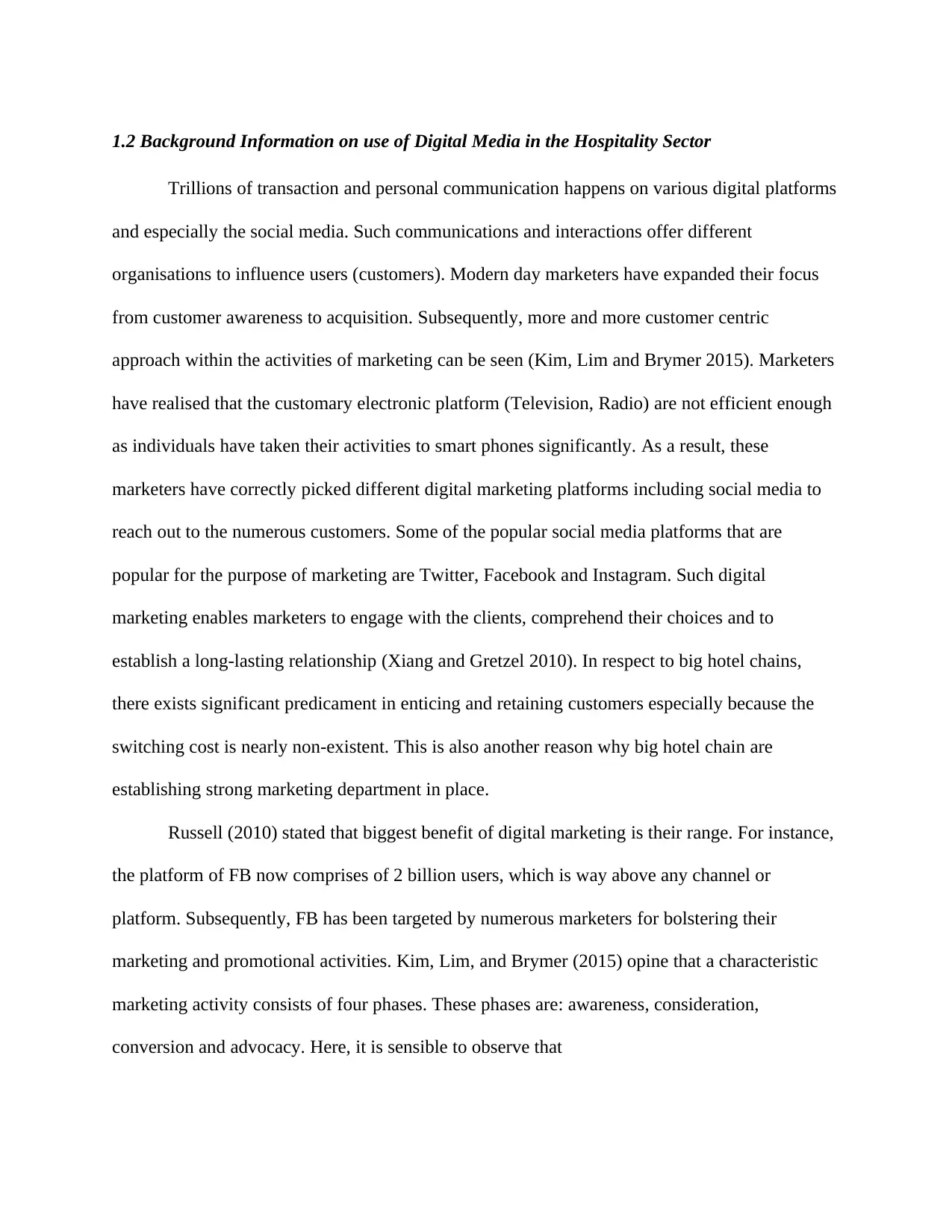
1.2 Background Information on use of Digital Media in the Hospitality Sector
Trillions of transaction and personal communication happens on various digital platforms
and especially the social media. Such communications and interactions offer different
organisations to influence users (customers). Modern day marketers have expanded their focus
from customer awareness to acquisition. Subsequently, more and more customer centric
approach within the activities of marketing can be seen (Kim, Lim and Brymer 2015). Marketers
have realised that the customary electronic platform (Television, Radio) are not efficient enough
as individuals have taken their activities to smart phones significantly. As a result, these
marketers have correctly picked different digital marketing platforms including social media to
reach out to the numerous customers. Some of the popular social media platforms that are
popular for the purpose of marketing are Twitter, Facebook and Instagram. Such digital
marketing enables marketers to engage with the clients, comprehend their choices and to
establish a long-lasting relationship (Xiang and Gretzel 2010). In respect to big hotel chains,
there exists significant predicament in enticing and retaining customers especially because the
switching cost is nearly non-existent. This is also another reason why big hotel chain are
establishing strong marketing department in place.
Russell (2010) stated that biggest benefit of digital marketing is their range. For instance,
the platform of FB now comprises of 2 billion users, which is way above any channel or
platform. Subsequently, FB has been targeted by numerous marketers for bolstering their
marketing and promotional activities. Kim, Lim, and Brymer (2015) opine that a characteristic
marketing activity consists of four phases. These phases are: awareness, consideration,
conversion and advocacy. Here, it is sensible to observe that
Trillions of transaction and personal communication happens on various digital platforms
and especially the social media. Such communications and interactions offer different
organisations to influence users (customers). Modern day marketers have expanded their focus
from customer awareness to acquisition. Subsequently, more and more customer centric
approach within the activities of marketing can be seen (Kim, Lim and Brymer 2015). Marketers
have realised that the customary electronic platform (Television, Radio) are not efficient enough
as individuals have taken their activities to smart phones significantly. As a result, these
marketers have correctly picked different digital marketing platforms including social media to
reach out to the numerous customers. Some of the popular social media platforms that are
popular for the purpose of marketing are Twitter, Facebook and Instagram. Such digital
marketing enables marketers to engage with the clients, comprehend their choices and to
establish a long-lasting relationship (Xiang and Gretzel 2010). In respect to big hotel chains,
there exists significant predicament in enticing and retaining customers especially because the
switching cost is nearly non-existent. This is also another reason why big hotel chain are
establishing strong marketing department in place.
Russell (2010) stated that biggest benefit of digital marketing is their range. For instance,
the platform of FB now comprises of 2 billion users, which is way above any channel or
platform. Subsequently, FB has been targeted by numerous marketers for bolstering their
marketing and promotional activities. Kim, Lim, and Brymer (2015) opine that a characteristic
marketing activity consists of four phases. These phases are: awareness, consideration,
conversion and advocacy. Here, it is sensible to observe that
Paraphrase This Document
Need a fresh take? Get an instant paraphrase of this document with our AI Paraphraser
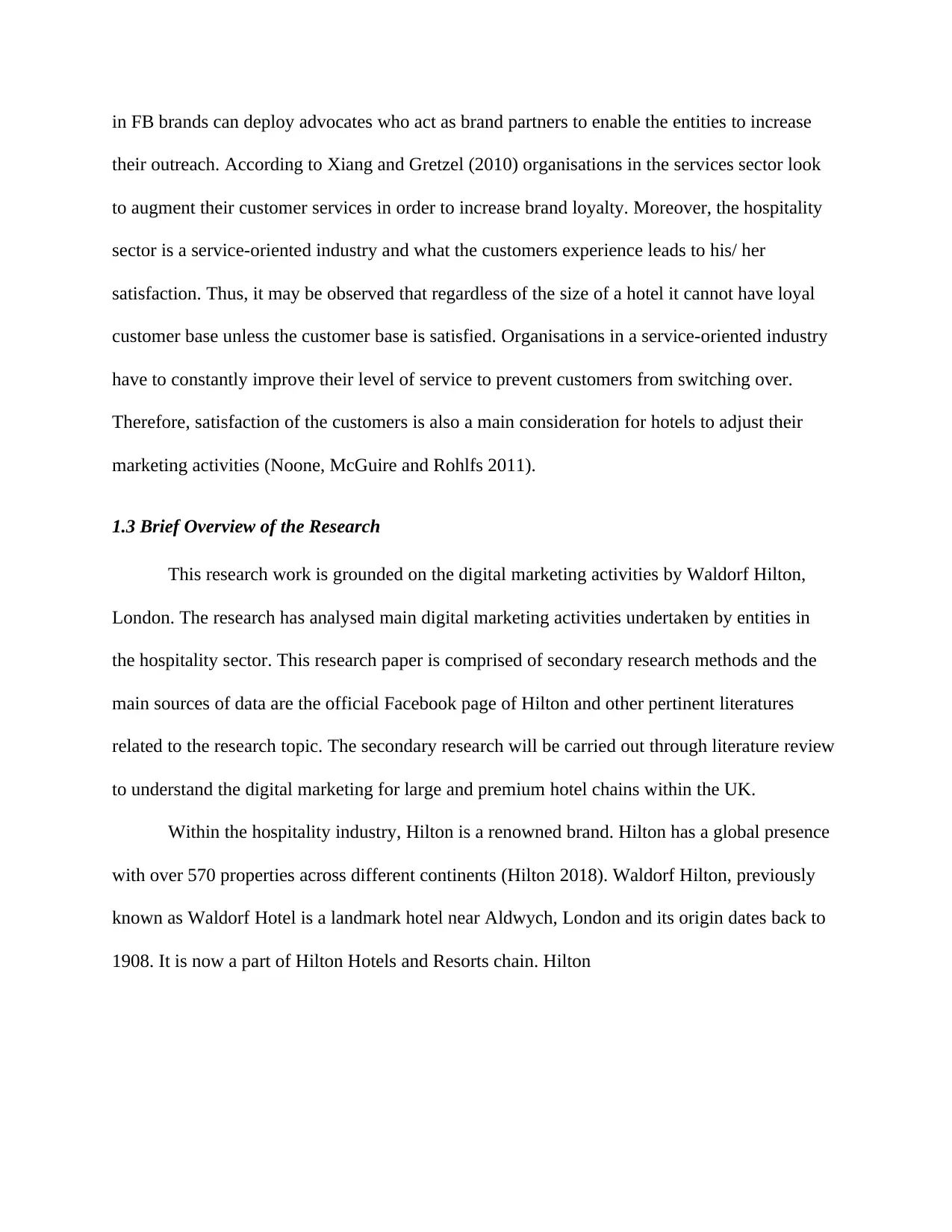
in FB brands can deploy advocates who act as brand partners to enable the entities to increase
their outreach. According to Xiang and Gretzel (2010) organisations in the services sector look
to augment their customer services in order to increase brand loyalty. Moreover, the hospitality
sector is a service-oriented industry and what the customers experience leads to his/ her
satisfaction. Thus, it may be observed that regardless of the size of a hotel it cannot have loyal
customer base unless the customer base is satisfied. Organisations in a service-oriented industry
have to constantly improve their level of service to prevent customers from switching over.
Therefore, satisfaction of the customers is also a main consideration for hotels to adjust their
marketing activities (Noone, McGuire and Rohlfs 2011).
1.3 Brief Overview of the Research
This research work is grounded on the digital marketing activities by Waldorf Hilton,
London. The research has analysed main digital marketing activities undertaken by entities in
the hospitality sector. This research paper is comprised of secondary research methods and the
main sources of data are the official Facebook page of Hilton and other pertinent literatures
related to the research topic. The secondary research will be carried out through literature review
to understand the digital marketing for large and premium hotel chains within the UK.
Within the hospitality industry, Hilton is a renowned brand. Hilton has a global presence
with over 570 properties across different continents (Hilton 2018). Waldorf Hilton, previously
known as Waldorf Hotel is a landmark hotel near Aldwych, London and its origin dates back to
1908. It is now a part of Hilton Hotels and Resorts chain. Hilton
their outreach. According to Xiang and Gretzel (2010) organisations in the services sector look
to augment their customer services in order to increase brand loyalty. Moreover, the hospitality
sector is a service-oriented industry and what the customers experience leads to his/ her
satisfaction. Thus, it may be observed that regardless of the size of a hotel it cannot have loyal
customer base unless the customer base is satisfied. Organisations in a service-oriented industry
have to constantly improve their level of service to prevent customers from switching over.
Therefore, satisfaction of the customers is also a main consideration for hotels to adjust their
marketing activities (Noone, McGuire and Rohlfs 2011).
1.3 Brief Overview of the Research
This research work is grounded on the digital marketing activities by Waldorf Hilton,
London. The research has analysed main digital marketing activities undertaken by entities in
the hospitality sector. This research paper is comprised of secondary research methods and the
main sources of data are the official Facebook page of Hilton and other pertinent literatures
related to the research topic. The secondary research will be carried out through literature review
to understand the digital marketing for large and premium hotel chains within the UK.
Within the hospitality industry, Hilton is a renowned brand. Hilton has a global presence
with over 570 properties across different continents (Hilton 2018). Waldorf Hilton, previously
known as Waldorf Hotel is a landmark hotel near Aldwych, London and its origin dates back to
1908. It is now a part of Hilton Hotels and Resorts chain. Hilton
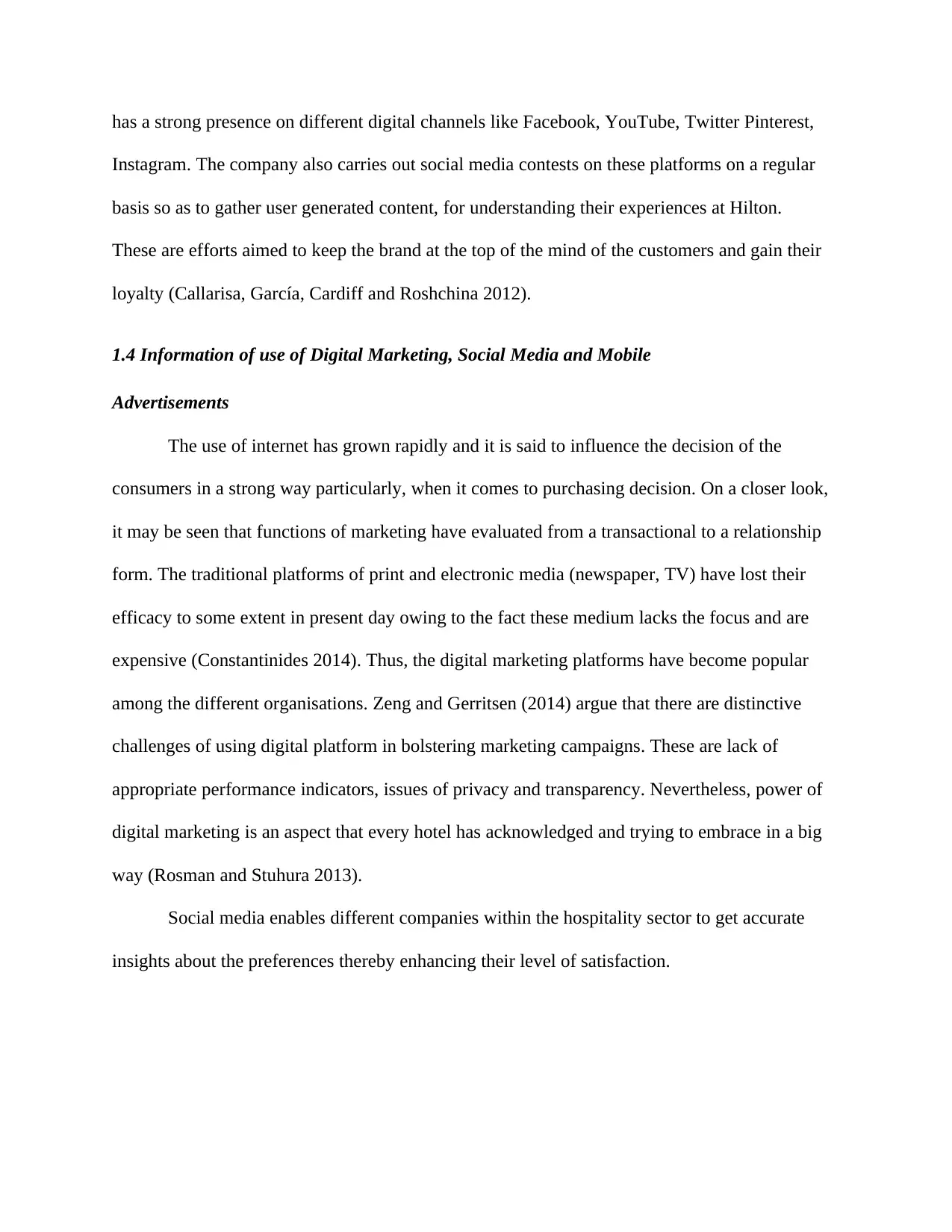
has a strong presence on different digital channels like Facebook, YouTube, Twitter Pinterest,
Instagram. The company also carries out social media contests on these platforms on a regular
basis so as to gather user generated content, for understanding their experiences at Hilton.
These are efforts aimed to keep the brand at the top of the mind of the customers and gain their
loyalty (Callarisa, García, Cardiff and Roshchina 2012).
1.4 Information of use of Digital Marketing, Social Media and Mobile
Advertisements
The use of internet has grown rapidly and it is said to influence the decision of the
consumers in a strong way particularly, when it comes to purchasing decision. On a closer look,
it may be seen that functions of marketing have evaluated from a transactional to a relationship
form. The traditional platforms of print and electronic media (newspaper, TV) have lost their
efficacy to some extent in present day owing to the fact these medium lacks the focus and are
expensive (Constantinides 2014). Thus, the digital marketing platforms have become popular
among the different organisations. Zeng and Gerritsen (2014) argue that there are distinctive
challenges of using digital platform in bolstering marketing campaigns. These are lack of
appropriate performance indicators, issues of privacy and transparency. Nevertheless, power of
digital marketing is an aspect that every hotel has acknowledged and trying to embrace in a big
way (Rosman and Stuhura 2013).
Social media enables different companies within the hospitality sector to get accurate
insights about the preferences thereby enhancing their level of satisfaction.
Instagram. The company also carries out social media contests on these platforms on a regular
basis so as to gather user generated content, for understanding their experiences at Hilton.
These are efforts aimed to keep the brand at the top of the mind of the customers and gain their
loyalty (Callarisa, García, Cardiff and Roshchina 2012).
1.4 Information of use of Digital Marketing, Social Media and Mobile
Advertisements
The use of internet has grown rapidly and it is said to influence the decision of the
consumers in a strong way particularly, when it comes to purchasing decision. On a closer look,
it may be seen that functions of marketing have evaluated from a transactional to a relationship
form. The traditional platforms of print and electronic media (newspaper, TV) have lost their
efficacy to some extent in present day owing to the fact these medium lacks the focus and are
expensive (Constantinides 2014). Thus, the digital marketing platforms have become popular
among the different organisations. Zeng and Gerritsen (2014) argue that there are distinctive
challenges of using digital platform in bolstering marketing campaigns. These are lack of
appropriate performance indicators, issues of privacy and transparency. Nevertheless, power of
digital marketing is an aspect that every hotel has acknowledged and trying to embrace in a big
way (Rosman and Stuhura 2013).
Social media enables different companies within the hospitality sector to get accurate
insights about the preferences thereby enhancing their level of satisfaction.
⊘ This is a preview!⊘
Do you want full access?
Subscribe today to unlock all pages.

Trusted by 1+ million students worldwide
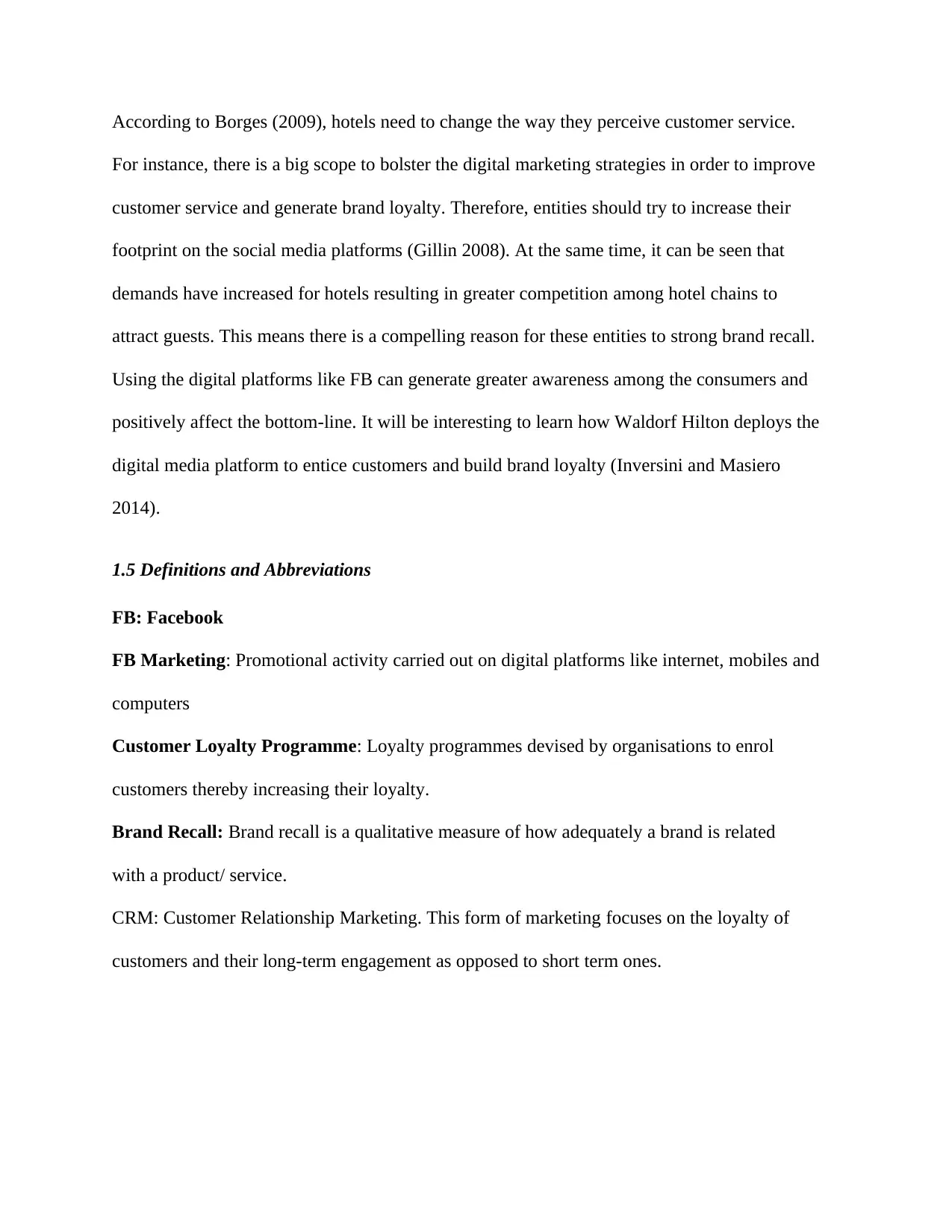
According to Borges (2009), hotels need to change the way they perceive customer service.
For instance, there is a big scope to bolster the digital marketing strategies in order to improve
customer service and generate brand loyalty. Therefore, entities should try to increase their
footprint on the social media platforms (Gillin 2008). At the same time, it can be seen that
demands have increased for hotels resulting in greater competition among hotel chains to
attract guests. This means there is a compelling reason for these entities to strong brand recall.
Using the digital platforms like FB can generate greater awareness among the consumers and
positively affect the bottom-line. It will be interesting to learn how Waldorf Hilton deploys the
digital media platform to entice customers and build brand loyalty (Inversini and Masiero
2014).
1.5 Definitions and Abbreviations
FB: Facebook
FB Marketing: Promotional activity carried out on digital platforms like internet, mobiles and
computers
Customer Loyalty Programme: Loyalty programmes devised by organisations to enrol
customers thereby increasing their loyalty.
Brand Recall: Brand recall is a qualitative measure of how adequately a brand is related
with a product/ service.
CRM: Customer Relationship Marketing. This form of marketing focuses on the loyalty of
customers and their long-term engagement as opposed to short term ones.
For instance, there is a big scope to bolster the digital marketing strategies in order to improve
customer service and generate brand loyalty. Therefore, entities should try to increase their
footprint on the social media platforms (Gillin 2008). At the same time, it can be seen that
demands have increased for hotels resulting in greater competition among hotel chains to
attract guests. This means there is a compelling reason for these entities to strong brand recall.
Using the digital platforms like FB can generate greater awareness among the consumers and
positively affect the bottom-line. It will be interesting to learn how Waldorf Hilton deploys the
digital media platform to entice customers and build brand loyalty (Inversini and Masiero
2014).
1.5 Definitions and Abbreviations
FB: Facebook
FB Marketing: Promotional activity carried out on digital platforms like internet, mobiles and
computers
Customer Loyalty Programme: Loyalty programmes devised by organisations to enrol
customers thereby increasing their loyalty.
Brand Recall: Brand recall is a qualitative measure of how adequately a brand is related
with a product/ service.
CRM: Customer Relationship Marketing. This form of marketing focuses on the loyalty of
customers and their long-term engagement as opposed to short term ones.
Paraphrase This Document
Need a fresh take? Get an instant paraphrase of this document with our AI Paraphraser
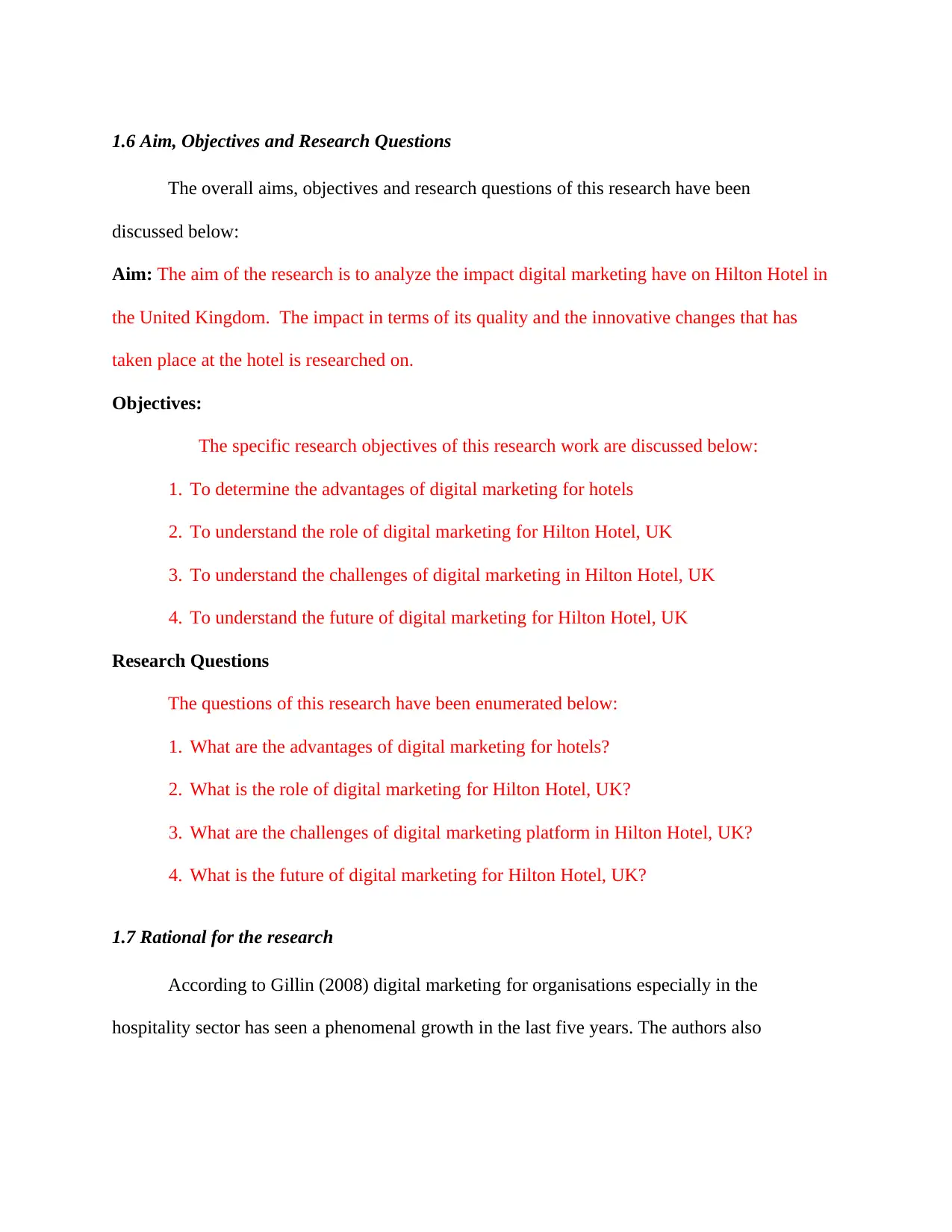
1.6 Aim, Objectives and Research Questions
The overall aims, objectives and research questions of this research have been
discussed below:
Aim: The aim of the research is to analyze the impact digital marketing have on Hilton Hotel in
the United Kingdom. The impact in terms of its quality and the innovative changes that has
taken place at the hotel is researched on.
Objectives:
The specific research objectives of this research work are discussed below:
1. To determine the advantages of digital marketing for hotels
2. To understand the role of digital marketing for Hilton Hotel, UK
3. To understand the challenges of digital marketing in Hilton Hotel, UK
4. To understand the future of digital marketing for Hilton Hotel, UK
Research Questions
The questions of this research have been enumerated below:
1. What are the advantages of digital marketing for hotels?
2. What is the role of digital marketing for Hilton Hotel, UK?
3. What are the challenges of digital marketing platform in Hilton Hotel, UK?
4. What is the future of digital marketing for Hilton Hotel, UK?
1.7 Rational for the research
According to Gillin (2008) digital marketing for organisations especially in the
hospitality sector has seen a phenomenal growth in the last five years. The authors also
The overall aims, objectives and research questions of this research have been
discussed below:
Aim: The aim of the research is to analyze the impact digital marketing have on Hilton Hotel in
the United Kingdom. The impact in terms of its quality and the innovative changes that has
taken place at the hotel is researched on.
Objectives:
The specific research objectives of this research work are discussed below:
1. To determine the advantages of digital marketing for hotels
2. To understand the role of digital marketing for Hilton Hotel, UK
3. To understand the challenges of digital marketing in Hilton Hotel, UK
4. To understand the future of digital marketing for Hilton Hotel, UK
Research Questions
The questions of this research have been enumerated below:
1. What are the advantages of digital marketing for hotels?
2. What is the role of digital marketing for Hilton Hotel, UK?
3. What are the challenges of digital marketing platform in Hilton Hotel, UK?
4. What is the future of digital marketing for Hilton Hotel, UK?
1.7 Rational for the research
According to Gillin (2008) digital marketing for organisations especially in the
hospitality sector has seen a phenomenal growth in the last five years. The authors also
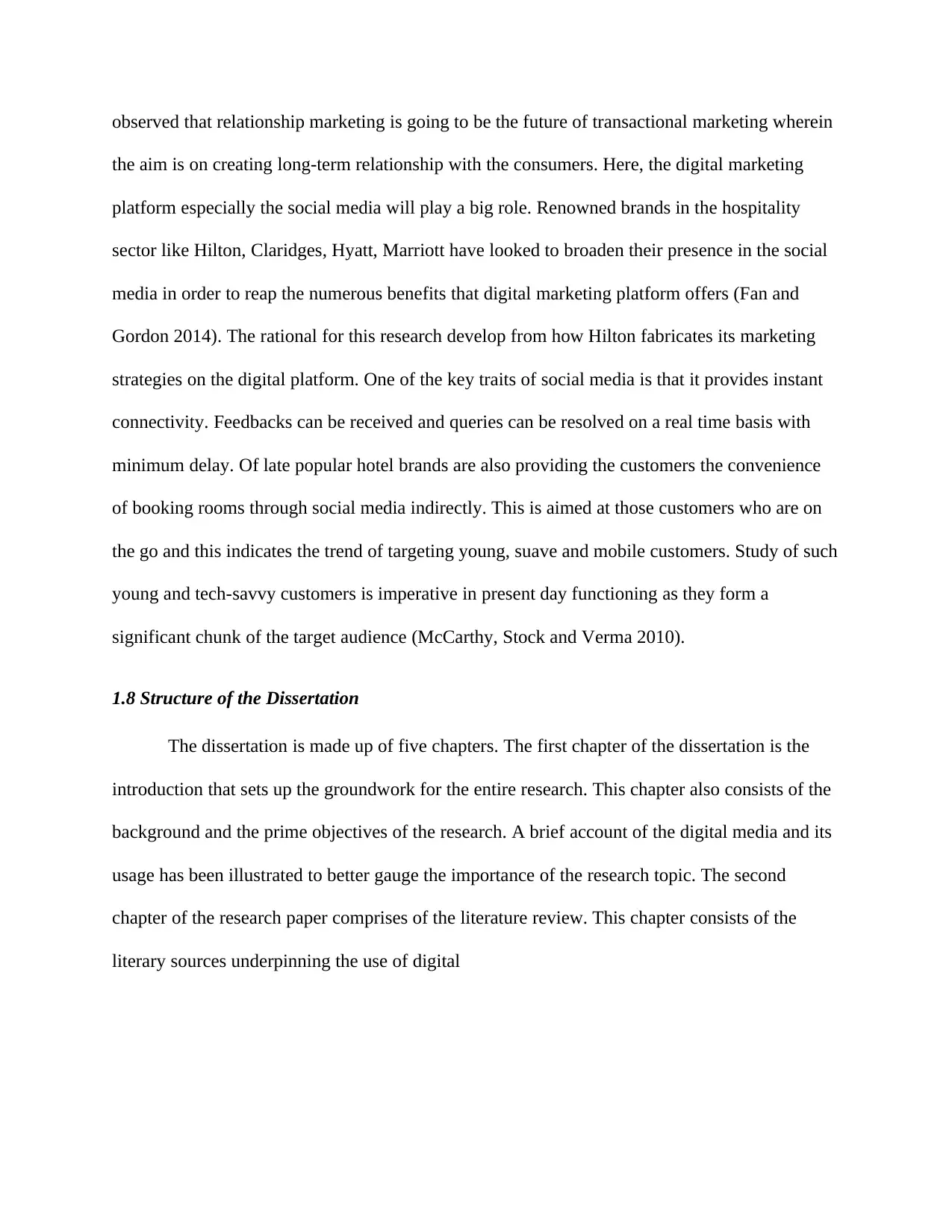
observed that relationship marketing is going to be the future of transactional marketing wherein
the aim is on creating long-term relationship with the consumers. Here, the digital marketing
platform especially the social media will play a big role. Renowned brands in the hospitality
sector like Hilton, Claridges, Hyatt, Marriott have looked to broaden their presence in the social
media in order to reap the numerous benefits that digital marketing platform offers (Fan and
Gordon 2014). The rational for this research develop from how Hilton fabricates its marketing
strategies on the digital platform. One of the key traits of social media is that it provides instant
connectivity. Feedbacks can be received and queries can be resolved on a real time basis with
minimum delay. Of late popular hotel brands are also providing the customers the convenience
of booking rooms through social media indirectly. This is aimed at those customers who are on
the go and this indicates the trend of targeting young, suave and mobile customers. Study of such
young and tech-savvy customers is imperative in present day functioning as they form a
significant chunk of the target audience (McCarthy, Stock and Verma 2010).
1.8 Structure of the Dissertation
The dissertation is made up of five chapters. The first chapter of the dissertation is the
introduction that sets up the groundwork for the entire research. This chapter also consists of the
background and the prime objectives of the research. A brief account of the digital media and its
usage has been illustrated to better gauge the importance of the research topic. The second
chapter of the research paper comprises of the literature review. This chapter consists of the
literary sources underpinning the use of digital
the aim is on creating long-term relationship with the consumers. Here, the digital marketing
platform especially the social media will play a big role. Renowned brands in the hospitality
sector like Hilton, Claridges, Hyatt, Marriott have looked to broaden their presence in the social
media in order to reap the numerous benefits that digital marketing platform offers (Fan and
Gordon 2014). The rational for this research develop from how Hilton fabricates its marketing
strategies on the digital platform. One of the key traits of social media is that it provides instant
connectivity. Feedbacks can be received and queries can be resolved on a real time basis with
minimum delay. Of late popular hotel brands are also providing the customers the convenience
of booking rooms through social media indirectly. This is aimed at those customers who are on
the go and this indicates the trend of targeting young, suave and mobile customers. Study of such
young and tech-savvy customers is imperative in present day functioning as they form a
significant chunk of the target audience (McCarthy, Stock and Verma 2010).
1.8 Structure of the Dissertation
The dissertation is made up of five chapters. The first chapter of the dissertation is the
introduction that sets up the groundwork for the entire research. This chapter also consists of the
background and the prime objectives of the research. A brief account of the digital media and its
usage has been illustrated to better gauge the importance of the research topic. The second
chapter of the research paper comprises of the literature review. This chapter consists of the
literary sources underpinning the use of digital
⊘ This is a preview!⊘
Do you want full access?
Subscribe today to unlock all pages.

Trusted by 1+ million students worldwide
1 out of 62
Related Documents
Your All-in-One AI-Powered Toolkit for Academic Success.
+13062052269
info@desklib.com
Available 24*7 on WhatsApp / Email
![[object Object]](/_next/static/media/star-bottom.7253800d.svg)
Unlock your academic potential
Copyright © 2020–2026 A2Z Services. All Rights Reserved. Developed and managed by ZUCOL.





